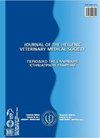Effects of Antioxidants Supplemented Feed in Coccidiosis Treatment, Blood Antioxidative Status, and Enzymatic Activity of Domestic Cats
IF 0.4
4区 农林科学
Q4 VETERINARY SCIENCES
引用次数: 0
Abstract
As coccidia become increasingly resistant to anticoccidial drugs, efforts have been made to find alternatives. In recent years, botanicals have been reported as potential alternatives to anticoccidials since they are effective against protozoa, arthropods, and helminths. In this study, different doses of dried pomegranate fruit (Punica granatum L.) were evaluated for their effectiveness in reducing the number of oocysts in domestic cats and their antioxidant properties. Under in vivo conditions, 24 six-month-old domestic cats of both genders naturally infected with Cytoisospora felis were tested. Four equal groups of infected cats were formed. Six cats made up each group. The control group (C) was on a basal diet, and one group received the chemical coccidiostat robenidine (CR), supplemented in the amount of 0.5%. Two levels of whole dried pomegranate fruit as a natural antioxidant were applied in a concentration of 0.5% (P1) and 1.0% (P2) on top of the basic diet. With the McMaster technique, oocysts number and eggs per gram of feces were determined. From each cat, 6 per group, blood samples were taken from a jugular vein at the end of the experimental period to investigate the influence of dried pomegranate fruit on blood enzymatic activity and lipid oxidation. In conclusion, supplementing cats' diets with dried pomegranate fruit reduced the number of oocysts per gram of feces significantly, but it is important to carry out further and more detailed studies to prove the anticoccidial and antioxidant properties of dried pomegranate fruit in cats' diets.抗氧化剂添加饲料对球虫病治疗、家猫血液抗氧化状态和酶活性的影响
随着球虫对抗球虫药物的耐药性越来越强,人们努力寻找替代品。近年来,植物药被报道为抗球虫药的潜在替代品,因为它们对原生动物、节肢动物和蠕虫有效。在本研究中,研究了不同剂量的石榴干对减少家猫卵囊数量和抗氧化性能的影响。在体内条件下,对24只自然感染猫胞异孢子虫的6个月大的家猫进行了测试。被感染的猫被分成四组。每组6只猫。对照组(C组)饲喂基础饲粮,其中1组添加0.5%的化学防球虫药罗拜尼定(CR)。在基础日粮上分别添加0.5% (P1)和1.0% (P2)的石榴干作为天然抗氧化剂。采用麦克马斯特技术测定卵囊数和每克粪便卵数。实验结束时,每组6只猫取颈静脉血样,研究石榴干对血酶活性和脂质氧化的影响。综上所述,在猫粮中添加石榴干可显著降低猫粮中每克粪便中卵囊的数量,但需要进一步开展更详细的研究来证明石榴干在猫粮中的抗球虫和抗氧化作用。
本文章由计算机程序翻译,如有差异,请以英文原文为准。
求助全文
约1分钟内获得全文
求助全文
来源期刊

Journal of the Hellenic Veterinary Medical Society
VETERINARY SCIENCES-
CiteScore
0.60
自引率
0.00%
发文量
83
审稿时长
>12 weeks
期刊介绍:
The Journal of the Hellenic Veterinary Medical Society (J Hellenic Vet Med Soc) is a quarterly peer-reviewed journal that publishes articles in all aspects of veterinary science and related disciplines. It is published by the Hellenic Veterinary Medical Society and is indexed in the Web of Science and in Scopus.
There are no publication fees in the journal. Authors considering submitting manuscripts for evaluation and publication are requested to read carefully the instructions for authors and fully comply with them.
Non-complying manuscripts may be returned to the corresponding author for formatting.
 求助内容:
求助内容: 应助结果提醒方式:
应助结果提醒方式:


